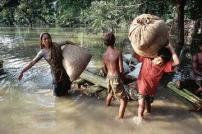 The most hard hitting UN report on climate change has concluded it is a reality for many of the world’s poorest people.
The most hard hitting UN report on climate change has concluded it is a reality for many of the world’s poorest people.
A catalogue of the “climate shocks” that have already hit the world is set out in the Human Development Report 2007/08. Fewer than two per cent of these have affected rich countries.
Europe had its most intense heatwave for 50 years and Japan its greatest number of tropical cyclones in a single year. But far more intense drought, floods and storms than usual have plagued the developing world.
Monsoons displaced 14 million people in India, seven million in Bangladesh and three million in China which has seen the heaviest rainfall – and second highest death toll – since records began. Cyclones blasted Indonesia, the Philippines and Vietnam. Hurricanes devastated the Caribbean and Central America, killing more than 1,600 Mayan people in Guatemala. Droughts have afflicted Africa, driving 14 million people from their homes.
Based on new climate modelling, the UN report has a number of strong messages. It is highly critical of US, EU and British policies on global warming. The report says George Bush’s home-state of Texas (population 23 million) has a bigger carbon footprint than the whole of sub-Saharan Africa (population 720 million).
The report also criticises Britain’s policy on climate change. The UK is the world leader on rhetoric, it says, yet “if the rest of the developed world followed the pathway envisaged in the UK’s Climate Change Bill, dangerous climate change would be inevitable”.
